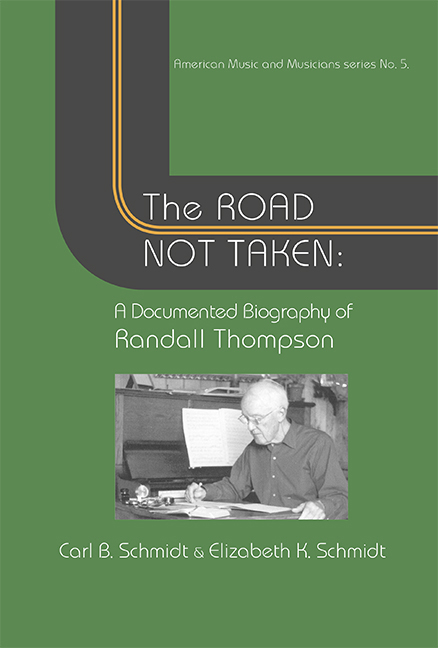Book contents
- Frontmatter
- Contents
- List of Illustrations
- List of Tables
- Library Sigla and Abbreviations
- Guide to Harvard University and Oberlin College Collections Referenced by Box Number
- Preface: Gateway to a Career
- Acknowledgments
- Chapter I Family History and Formative Years
- Chapter II Undergraduate Study at Harvard College (1916-20)
- Chapter III Lessons with Ernest Bloch and Graduate Study at Harvard University (1920-22)
- Chapter IV Damrosch Fellowship Years at the American Academy in Rome (1922-25)
- Chapter V Courtship and Marriage (1925-27)
- Chapter VI New York City—Wellesley College—A Guggenheim Fellowship (1927-31)
- Chapter VII Guest Conducting, Reception of Symphony no. 2, and College Music: An Investigation (1931-35)
- Chapter VIII Life after College Music: An Investigation (1935-37)
- Chapter IX The University of California at Berkeley (1937-39)
- Chapter X Curtis Institute of Music: The Hiring Process (Spring and Summer 1939)
- Chapter XI Curtis Institute (Fall 1939-Spring 1941)
- Chapter XII The University of Virginia (Fall 1941-Spring 1945)
- Chapter XIII Princeton University (Fall 1945-Spring 1948)
- Chapter XIV Return of a Favored Son: Harvard University (Fall 1948-Spring (1957)
- Chapter XV Harvard University (Summer 1957 to July 1, 1965)
- Chapter XVI The Early Retirement Years (1965-75)
- Chapter XVII The Final Years (1975-84)
- Chapter XVIII Recapitulation and Coda
- Bibliography of Works Cited by Abbreviations
- Index
Chapter X - Curtis Institute of Music: The Hiring Process (Spring and Summer 1939)
- Frontmatter
- Contents
- List of Illustrations
- List of Tables
- Library Sigla and Abbreviations
- Guide to Harvard University and Oberlin College Collections Referenced by Box Number
- Preface: Gateway to a Career
- Acknowledgments
- Chapter I Family History and Formative Years
- Chapter II Undergraduate Study at Harvard College (1916-20)
- Chapter III Lessons with Ernest Bloch and Graduate Study at Harvard University (1920-22)
- Chapter IV Damrosch Fellowship Years at the American Academy in Rome (1922-25)
- Chapter V Courtship and Marriage (1925-27)
- Chapter VI New York City—Wellesley College—A Guggenheim Fellowship (1927-31)
- Chapter VII Guest Conducting, Reception of Symphony no. 2, and College Music: An Investigation (1931-35)
- Chapter VIII Life after College Music: An Investigation (1935-37)
- Chapter IX The University of California at Berkeley (1937-39)
- Chapter X Curtis Institute of Music: The Hiring Process (Spring and Summer 1939)
- Chapter XI Curtis Institute (Fall 1939-Spring 1941)
- Chapter XII The University of Virginia (Fall 1941-Spring 1945)
- Chapter XIII Princeton University (Fall 1945-Spring 1948)
- Chapter XIV Return of a Favored Son: Harvard University (Fall 1948-Spring (1957)
- Chapter XV Harvard University (Summer 1957 to July 1, 1965)
- Chapter XVI The Early Retirement Years (1965-75)
- Chapter XVII The Final Years (1975-84)
- Chapter XVIII Recapitulation and Coda
- Bibliography of Works Cited by Abbreviations
- Index
Summary
To hand down through contemporary masters
the great traditions of the past.
To teach students to build
on this heritage for the future.
(Purpose of the Curtis Institute at the time)
CURTIS IN 1939
During the late 1930s Philadelphia's Curtis Institute of Music (C.I.M.), founded by Mary Louise Curtis Bok in 1924, went through a rough patch that was not unlike the one that ended Randall's two-year tenure as Director of the Institute in June 1941. Josef Hofmann (1876-1957), who had headed the piano department from C.I.M.'s inception and was its Director from 1927-38, was being eased out of his position by Bok. Gregor Benko and Terry McNeill, who have written about Hofmann's demise as Director, described how it transpired.
The Institute had been deprived of the Director's guidance for most of the year, and Mary Bok and the other Board members managed the school while he was away. Her annual President's report dated 13 June 1938 stat¬ed that “it became evident in early spring that a drastic curtailment of our expenditures would have to be made.” She reported that she decided to make several changes, among them the reduction of the number of weeks in the school year, the reorganization of some departments and the drop-ping of others entirely as well as a minimal salary cut for non-faculty staff members, and a much higher cut for the faculty, and the introduction of a new policy that provided little or no financial aid for students. The report was apparently a sham, insinuating as it did that there had been fiscal mis¬management and shoddy executive planning… .
The device the Boks used was an offer for him to continue as Director, but with most of his artistic policies dismantled and his salary less than half of the previous year.
Under these circumstances, and when no solution presented itself, Hofmann tendered his resignation on September 26, 1938. Then, after summarily re¬jecting Bok's effort to retain him as a piano instructor on an hourly basis, he moved his family to California where he eventually suffered a mental break¬down. Bok quickly saw to the removal of virtually every material vestige of Hofmann's lengthy association with the Institute. The account of his resigna¬tion contained in her President's Report to the Board of Directors on June 1, 1939, therefore seems rather ingenuous.
- Type
- Chapter
- Information
- The Road Not TakenA Documented Biography of Randall Thompson, 1899–1984, pp. 401 - 428Publisher: Boydell & BrewerPrint publication year: 2018

